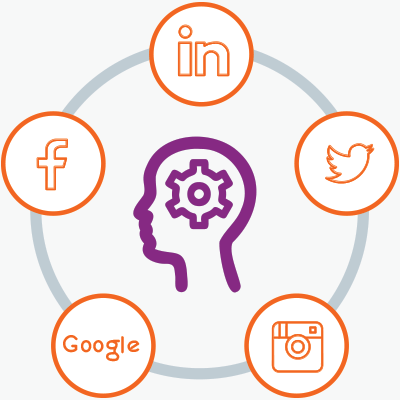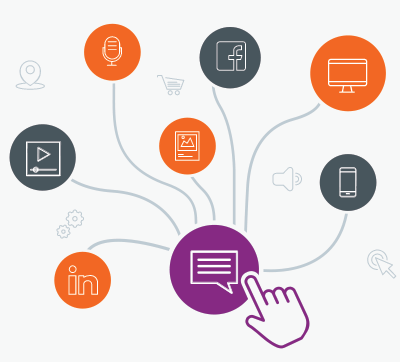How to improve your results with digital marketing
The world is changing, and businesses need to change with it if they want to survive. With the values, interests and priorities of customers shifting, and with people moving more and more towards digital platforms, the time of ‘salesy’ business marketing is coming to a close.
These days it’s not enough to simply set up shop on the best street in town and pay for a couple of billboards to let people know you’re there.
If you want your business to thrive, you need to develop a strong brand strategy that lays out your business goals and how you’ll achieve them.
With the rise of the internet, smartphones and social media, your customers are everywhere all the time… if you know how to connect with them. The problem is that the internet is flooded with millions of businesses all trying to get your customers’ attention. So how do you get your target market to notice you? Let alone remember you?

Estimates suggest that it takes roughly 5-7 impressions for people to recognise a brand, which means that without a consistent multichannel presence online, you may find that your brand gets forgotten by your target market. Studies have shown that revenue can be increased by up to 23% when you present your brand consistently across multiple platforms. With the right integrated creative and messaging, you can increase brand recall and generate more leads for better results in your business marketing.
Businesses who are able to develop a strong integrated marketing strategy will flourish in this new digital world, while those who can’t change with the times will fall behind.
These days, your customers are used to having all the information at their fingertips. They want to be informed. They want to know about you: who you are, what you stand for, and why you’re better than the competition. For that reason, the internet represents a huge opportunity for businesses who can provide their customers with the information they seek.
“
With the average internet user spending 6.5 hours online a day there has never been a better time to go digital with your marketing.
”
While many businesses fail to adapt to marketing digitally, there are many success stories. Take Domino’s as an example:

Domino’s demonstrated one of the most successful digital transformations of its time.
Failing to make sales and with shares dropping to an all-time low in 2008, Domino’s turned to social media as they completely overhauled their brand strategy. Domino’s digital transformation was so successful that they toppled Pizza Hut as the largest pizza company in the world.
Their success was only achieved by adopting a fantastic integrated marketing strategy and dedicating themselves to becoming an ‘e-commerce company that happens to sell pizza’. With a focus on accessibility, Domino’s can now be ordered on their company app, as well as through Slack, Facebook Messenger, Smart TV, and even Twitter – with the use of emojis.
Domino’s success demonstrates why you must develop a clear digital marketing plan that leverages multiple channels and takes advantage of the power of integrated creative and messaging. Whether you’re a marketing manager, or the owner of your own business, you need to understand the importance of a strong integrated marketing plan.
With the right digital strategy, you can ensure that it’s your business that sticks in the minds of your customers.
Here’s how you can really rock your digital marketing for your business.
Know your audience
If you want to market your brand to your customers successfully, you first need to know who they are. Once you know who you’re selling to, the how becomes much easier. You can really go deep with this. Not only should you find out about their interests, values, behaviours and backgrounds, you also need to understand their digital media journey and how they navigate the internet.

Ask yourself the following questions:
- Who are your customers? (Age, Gender, Education etc.)
- Where do they live?
- What platforms do they use to make purchases?
- What influences their purchasing decisions? (Retargeting? Reviews? User-generated content?)
- What do they value?
- Where do they spend time online?
Once you’ve gathered this information, you can separate your audience into sections based on their backgrounds and behaviours.
Develop audience personas
An audience persona is a hypothetical person that represents the common traits of your target audience.
You want to develop a different persona for each section of your audience.
Take Julie as an example. Julie is a Marketing Executive for a mid-market B2B company that sells business technology solutions in Australia. Julie steers the direction for her business and sets the goals for all marketing efforts. Nothing happens without Julie’s knowledge and approval.

Now, Julie isn’t real, but she represents a lot of people who are.
By developing an audience persona like Julie, you now have someone to target your marketing campaigns towards. By making your digital marketing plan relevant to Julie, you’re ensuring that it’s relevant to all customers like her.
The more you can flesh out your personas, the more targeted your marketing can be.
Create digital media journeys
Now that you understand who your audience is and how they behave online, you can start tailoring your digital marketing campaigns to them.
With an understanding of your target market’s digital journey, you now have the knowledge to create clever, compelling and relevant cross-platform advertisements that convert into sales.
Let’s say, for example, you know that most of your target market is active on LinkedIn and Facebook. You can use LinkedIn to laser-target ads to your most profitable audience, then remarket to them using an irresistible offer on Facebook.

This is how the best integrated marketing strategies work. Once you learn how your customers travel through the digital world, you can offer them pathways that lead them right to your business.
Don’t forget to keep your brand’s ‘voice’ consistent between all digital platforms. A consistent brand identity is the key to developing trust with your target market.
If your customers aren’t sure who the real you is, they’re not going to trust you; and a customer that doesn’t trust you is unlikely to want to buy from you.
Review marketing campaigns that used to work
With customer trends forcing businesses to focus on online marketing, you may feel compelled to forget about the traditional marketing campaigns that don’t work anymore. But to forget past success is to neglect a valuable resource for your digital marketing future.
Ask yourself:
- What traditional media channels used to work for you?
- What made them successful?
- Why aren’t they successful anymore?
- Is there a digital equivalent to that old traditional channel?
“
By working out what traits of traditional marketing made your old ad campaigns successful, you can find the holes in your digital strategy, and plug them with their digital equivalents..
”
Sometimes you don’t need to throw out old material, you just need to find a way to repurpose it. Things that used to work may still work if you can find their digital equivalent. For example, paying the big bucks to get an ad on the side of a bus may not work quite as well as it used to, but the concept is still solid.
So what forms of digital advertising can you think of that, like the bus, can pass through people’s subconscious as they go about their digital lives? Maybe a banner on a related website, or perhaps an ad on Instagram would serve the same purpose.
Look back on old campaigns and keep an eye out for ways you can adapt them to online marketing.
Establish goals, objectives and KPIs
How will you determine whether your targeted digital campaigns have been a success?
Well, it depends on your definition of ‘success’.
By deciding what success is and how you want to measure it, you’ll be able to track your progress with analytics and insights.
To do this, you need to establish your goals, objectives and KPIs.

Goals are your general intentions for your business, while your objectives are specific, measurable targets that will allow you to achieve those goals. For example, it may be your goal to become more visible online. To achieve this, your objectives may be to:
- Get 1,000 new Facebook followers a month
- Triple your organic traffic by August
- Halve your bounce-rate by November
KPIs (Key Performance Indicators) are the metrics by which you measure your success. For example, if you wanted to measure the success of your growth marketing, you might track the following:
- New Facebook followers
- Organic traffic
- Leads generated
- New customers
- Revenue
Defining goals and objectives isn’t easy. That’s why many businesses choose a digital marketing agency to help them define clear pathways to success. An integrated marketing agency can help you track your KPIs across all marketing platforms, and offer insights into what your data means, and how best to act on it.
Your business strategy
Now it’s time to develop your business strategy and put it into practice.
When people make a purchase online, they follow a very predictable series of steps. You must prepare an action for every step of this journey.
- Awareness – Customer becomes aware of a challenge or need in their life
- Research – Customer researches the problem and potential solutions
- Comparison – Customer compares competitive products
- Purchase – Customer makes a purchase
- Retention – Customer uses your product and establishes an opinion of your brand
Every step of the buying cycle must be dealt with individually.
For example, while a great USP is invaluable to someone in the comparison stage of making a purchase, it’s all but useless to someone only just becoming aware that they have a need. By that same token, a strong content marketing strategy may prove essential during the awareness, and research phase, but may not be overly useful for retention.
By understanding each step of the buying cycle and having an appropriate action prepared, you can gently guide potential customers from awareness right through to purchase, and beyond!
The most popular marketing channels
While current trends aren’t a guarantee of future success, a survey conducted in 2018 indicated that social media marketing was the most popular form of online marketing, closely followed by content marketing.
SEO didn’t fair quite as well in the survey, but it was still considered a very important factor for digital success. Make sure to focus on the customer experience first. If there’s a choice between quality content, and cramming another keyword into your writing, always choose quality.
You may be trying to rank with search engines, but never forget that you’re selling to people.
Implement best-practice SEO techniques without becoming a slave to them.
Questions to ask when going digital with marketing
In order to ensure your business marketing is successful, you have to decide how and where to market online.
Ask yourself the following questions.
- What channels are available to you right now?
- Where are your ideal customers spending their time?
- If you’re already using online marketing channels, which ones are performing best? Which ones are performing the worst?
- Should you be spending more time on one channel and less on another?
Only focus your efforts on marketing channels that are worth your time. There’s no point marketing to Instagram if your ideal customers use Twitter.
Sometimes you’re better off spending more energy on less channels so you can focus on optimising your creative strategies.
One thing to remember for a successful integrated marketing campaign
Consistently presenting your brand across multiple platforms can boost brand recall, but to develop trust with your target market, you need to ensure that your brand’s identity and ‘voice’ remain consistent across those channels too.
You want your customers to remember you, but you also want them to remember that they trust you, and if you aren’t clear about who you are, they aren’t going to.
Need help developing your marketing plan?
Check out our free marketing plan guide for expert advice on how to develop your marketing plan.
We’re a Melbourne-based integrated marketing agency with years of experience helping businesses around the world establish multi-channel marketing plans. If you want to improve the results from your digital marketing but don’t know where to start, we’d love to help. Simply tell us a little about yourself and your challenges and we’ll reach out to schedule a time to discuss this further with you.
Shoot us a message if you have any questions or would like to know more.




